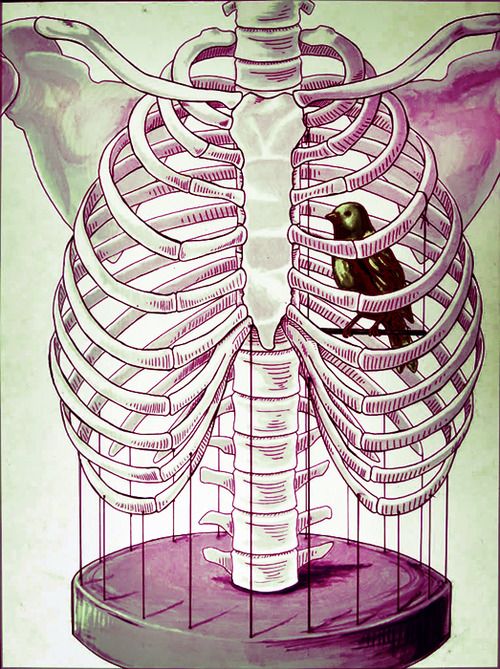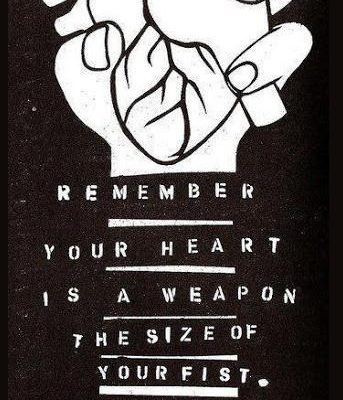This blog was originally hosted at Empty Cages Design.org as part of a series on Overcoming Burnout from 2016-2017. It has now been turned into a book that is available at: https://solidarityapothecary.org/overcomingburnout/
This blog post is about the biology of burnout. The last two months I’ve pretty much been in bed. The cartilage in my rib cage is inflamed and I’ve been diagnosed with costochondritis. Unable to do much that is physically or emotionally taxing without causing painful flare ups. It literally feels like someone is scraping the insides of my ribs with a scalpel, or stabbing me with a knife every time I take a deep breath. As a result of this, I’ve had this deepened connection with my body, and had a craving to understand its biology.
The effects of chronic stress
Stress in itself can be great. There are multiple definitions but my favourite is ‘stress is any change to which you must adapt’. Because it makes it sound sexy and fun, like a challenge. Stress can and does test you and challenge you in good and bad ways. Physiologically, in a shameful attempt at a brief explanation – stress can trigger this well-known ‘fight, flight or freeze reaction’ that increases nervous system activity, releases adrenalin, increases heart rate and blood pressure, constricts blood vessels and mobilises the liver’s energy reserves through the release of stored glucose. This bad-ass evolutionary reaction can save your life.
However if stress is continuous then the adrenal cortex itself becomes increasingly involved in the stress reaction. The anterior pituitary gland releases the adrenocorticotrophic hormone (ACTH) into the blood stream which controls the activity of the adrenal cortex. Sounds well clever eh? What the hell are adrenal glands? I kind of imagined weird nodules in my neck or something, but actually they are small structures sitting on top of your kidneys.
This chronic kind of stress is well documented to be harmful. In the ‘The Relaxation and Stress Reduction Workbook’ (that I’d highly recommend), the authors write:
“Unfortunately, when the fight or flight response continues unchecked during times of chronic stress, something else happens that can have long term negative effects. Your adrenal glands start to secrete corticoids (adrenaline or epinephrine, and norepinephrine), which inhibit digestion, reproduction, growth, tissue repair, and the responses of your immune and inflammatory systems. In other words, some very important functions that keep your body healthy begin to shut down” [1].
So whether you like it or not, long term stress is physically affecting you, and like me, you may not be aware of it at all until getting sick. We are not valuing our bodies in our struggles. My personal feelings are that in anarchist/activist circles, we kind of underplay stress. It becomes an individual/atomised game of who is strong/weak/able to cope/not able to cope. We brush off traumatic experiences because we have a tendency to either perpetuate a macho culture, or because we minimise our experiences in relationship to the oppression we are fighting. For example, I don’t think what I might go through is stressful, because I’m on the outside and can access support, compared to my mates that are locked up in jail. So this constant minimisation/comparing game gets us nowhere, our personal struggles become our secrets and the impacts of what we’re doing in our lives are not acknowledged or acted upon. We just struggle on.
It’s hard to identify a body system that stress doesn’t affect. Stress can affect the reproductive system, reducing fertility, and extended periods of depression can result in osteoporosis (we are literally carrying stress in our bones). Chronic stress makes your heart work hard for too long, putting you at risk of strokes and heart attacks. Under stress, your liver produces extra blood sugar (glucose) to give you a boost of energy. Unused blood sugar is reabsorbed by the body. If you’re under chronic stress, your body may not be able to keep up with these extra glucose surges, and you may be at an increased risk of developing type 2 diabetes [2].
Ever felt how your muscles tense up when you’re stressed? Well what if that repeats and repeats and repeats? You got it. Muscle pain. I once spoke to a guy who does bodywork at a permaculture event. It was maybe two years after I had left prison at most. He told me my body looks like I’m always ready for a fight. Kind of hyper vigilant and protecting my main organs. I realised for so long I’d been rolling my shoulders inwards as a result of ‘keeping my head down’ in jail and always subconsciously being aware of danger (fights, attention from screws etc.), as well as from the impact of living under close police surveillance for two years before my arrest.
There are a bunch of scientific theories about stress; looking at stress as a stimulus, stress as a response and stress as a perceived threat. The stimulus theory is interesting because it highlights our uniqueness – for some, going out raving is an absolute joy, for others, loud music and strangers might be their idea of hell and as a result be super stressful. Likewise, we might respond to a stress stimulus differently depending on our situations and physicality. Like when going on a prison visit is way more miserable with PMT and a bad night’s sleep.
I think the perception theory is perhaps the most interesting. And maybe sheds a tiny bit of light as to how so many amazing organisers cope with full-on situations. How stressful we experience situations can be magnified by our perceptions of them. Think divorce is the worst thing in the world? Then your parents splitting up is going to be unbearably stressful. This theory, I think, is what compensates for organisers being able to cope with stress and pressure. Maybe the relish we take in street battles with police actually strengthen us, because of our perception of the situation (but even if we perceive it as exciting or not frightening, our bodies are still pumping those hormones).
Likewise, it is well documented how stress relates to control, and how much of it we have, with the most stressful situations being those when we feel helpless. So yes, fighting fascists on the streets is probably going to be scary and stressful, but having support around you and feeling in control of situations will reduce the effects. On the other foot, perhaps experiencing repression and feeling a loss of control (through things like being arrested/detained/imprisoned/not knowing what will happen in long term legal cases) will heighten the physiological impact of stress.
The biology of burnout
For a while, I kind of thought burnout was more a psychological thing with physical repercussions. It was how I was feeling emotionally that was affecting how I was feeling physically. However I’ve realised through this research that actually all my lifestyle choices, despite my consent and active pursuit (even admittedly large enjoyment/embrace of certain situations that others may feel are stressful), were/are having physiological impacts in my body. That I had completely, utterly underestimated. I had made my judgements on my day-to-day evaluations of my health: that I didn’t get colds very often, I loved kickboxing, had sustained energy and very positive mental health. Meanwhile my body was actually slowly getting more and more affected by chronic stress than I had realised, affecting my ability to cope and ‘bounce back’ when needed. Now I can see that actually my body is affecting my feelings, and I’m not completely dominated by emotion after all (but hell, they were never separate anyway before good old Descartes).
A super interesting doctor and researcher, Esther Sternberg, writes how chronic unrelenting stress can change the response to stress itself:
“Some studies are beginning to show that burnt-out patients may have not only psychological burnout, but also physiological burnout: a flattened cortisol response and inability to respond to any stress with even a slight burst of cortisol. In other words, chronic unrelenting stress can change the stress response itself. And it can change other hormone systems in the body as well.” [3]
So situations that I’ve been faced with a hundred times, like organising massive events, demos, prisoner support etc., which I don’t perceive as unusually stressful but probably ignite that response in my body, I now am struggling to respond to because those hormones just aren’t playing ball anymore.
Well-recognised physical symptoms of burnout might include: exhaustion, fatigue, depression, insomnia, headaches, gastrointestinal problems (especially ulcers), frequent colds and flu, weight loss or gain, shortness of breath, hypertension, high cholesterol, coronary disease, impaired speech and ‘sexual dysfunction.’ [3]
I actually remember saying to my Mum last year I felt like something was chemically imbalanced in my brain. I knew this because everything I was facing I knew I could cope with and have interacted with hundreds of times, yet I was hyper emotional, with debilitating PMT and symptoms of depression – something was amiss in my cells, and I could feel it.
Both fascinating and scary is that burnout literally changes the brain. One experiment with a control group and burnout group, doing a variety of tests over time showed that burnt out individuals demonstrated less control over their reactions to negative experiences (kind of like a spiral of doom). The participants had regular brain scans, and you could see how burnout is literally changing their brains. The self-identified burnt out participants had a pattern of the amygdala being enlarged (part of the brain associated with fear and anxiety), and other connections in the brain were weaker, meaning that task responses were slower [4]. So they may have taken longer to complete simple tasks (hello, that’s why my email inbox processing is so slow).
I’m doing a very bad job of trying to summarise a scientific article in a paragraph, but what I’m trying to get at is that actually long term stress/overwork is having a biological impact which is affecting your behaviour, feelings and ability to function and thus ability to cope with stress.
The physiological effects of grief
The physiological effects of grief are also documented. A recent study showed people who had lost a love one can have reduced immunity because of reduced functioning in their neutrophils – a white blood cell used to fight off infections [5]. My best friend Gilly died just over a year after a super close friend of ours, Jo, had died (Gilly’s best friend). The grief and depression as a result of it literally weakened her immune system. While researching this blog, I found an article in the Telegraph describing how researchers found that hip fracture can also lead to this same hormone balance that suppresses the immune system, meaning infections like pneumonia are more likely to occur and be fatal [6]. (Gilly fractured her pelvis three months before she died).
Seeing a local herbalist and talking through a timeline of getting ill made me realise that I had caught a cold on the anniversary of Gilly’s death and went to hospital the day I buried her, a year exactly to the day. In Traditional Chinese Medicine the lungs are associated with grief. Even though it had been a year, it’s likely that feeling grief in the same physiological way, in the build up to the anniversary, most likely weakened my immune system and reduced my ability to counter my chest infection and its subsequent development of costochondritis.
So what is the point of this long blog post?! Well my key points are:
- Burnout isn’t just psychological e.g. not coping, or being unhappy with your life – it’s actually intimately related to brain chemistry and your physiology.
- Chronic stress reduces your ability to then cope with more stress. Those damn hormones again.
- These physiological changes can affect everything – from how you’re feeling emotionally (like feeling depressed/tearful) to your ability to complete tasks that you have probably completed easily and quickly a hundred times before.
Taking this holistic, but scientific worldview can actually be really empowering, explain a whole bunch of symptoms of burnout and why you feel out of control of how you feel (like you literally can’t get up early if you try or you can’t concentrate on tasks). So please don’t punish yourself or feel like a failure.
The good thing is there are ways to nourish your body and address the physiological impacts of chronic stress, which in turn could genuinely support you in recovering from burnout. I’ll definitely blog about this in the upcoming weeks, as I know they are really helping me heal and get my energy back.
References
1. The Relaxation and Stress Reduction Workbook, Martha Davies et al.
2. http://www.healthline.com/health/stress/effects-on-body#sthash.hREXrTuP.dpuf
3. https://www.brainpickings.org/2015/07/20/esther-sternberg-balance-within-stress-emotion
4. http://blogs.plos.org/neuro/2014/10/16/what-does-work-related-burnout-do-to-the-brain
5. http://www.theatlantic.com/health/archive/2014/09/understanding-how-grief-weakens-the-body/380006
6. http://www.telegraph.co.uk/news/health/news/9164466/Grief-leaves-the-body-at-risk-of-infection.html





No Comments